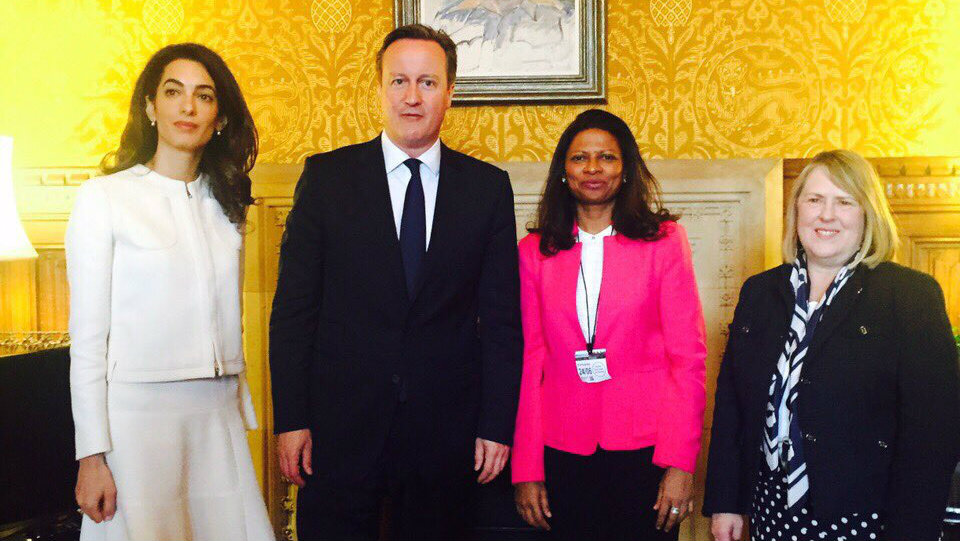British Prime Minister David Cameron has urged the Maldives to release jailed ex-president Mohamed Nasheed and other political prisoners.
Cameron is the first head of government or state to demand Nasheed’s release. In a tweet following a meeting with Nasheed’s wife Laila Ali and lawyer Amal Clooney in London on Wednesday, he also called for political dialogue in the Maldives.
PM: Good to meet with wife of former #Maldives President. There needs to be political dialogue, release of Nasheed & all political prisoners
— UK Prime Minister (@Number10gov) June 24, 2015
Cameron’s tweet appears to signal an important shift in the UK government’s stance on the Maldives. While the UK has continued to raise concern over the apparent lack of due process in Nasheed’s rushed trial on terrorism charges, it had previously stopped short of calling for the opposition leader’s release.
In 2011, Cameron described Nasheed as his “new best-freind.” His Conservative Party has helped Nasheed’s Maldivian Democratic Party with election campaigns and party building.
Nasheed has since been transferred to house arrest for eight weeks on the doctor’s advise. The opposition leader’s imprisonment had triggered a political crisis with daily protests and the arrests of hundreds of opposition supporters.
Diplomatic pressure has been growing on President Abdulla Yameen’s regime over a deteriorating human rights situation in the Maldives.
US Senators John McCain and Jack Reed, who chair the Senate Armed Forces Committee, on June 2 urged the US government to press for the opposition leader’s release and warned that the Maldives’ decisions are “having serious adverse consequences on its relationships abroad.”
In April, the EU parliament adopted a resolution calling for Nasheed’s freedom, and requested member countries to warn travelers on the human rights situation in the Maldives.
According to a statement by Nasheed’s office, Laila also met with Hugo Swire, the minister of state, foreign and commonwealth office on Wednesday.
In April, Laila also filed a petition with the UN working group on arbitrary detention requesting a judgement declaring Nasheed’s detention illegal and arbitrary. The UN has now asked President Abdulla Yameen’s government for a response.
Nasheed’s transfer to house arrest this week appears to be a first step towards political reconciliation between Yameen’s government and the opposition.
President Yameen maintains he has no constitutional authority to release Nasheed, and says he must exhaust all appeal processes before a clemency plea could be considered.
On June 18, the government announced it had hired a law firm owned by Cherie Blair, the wife of UK’s former prime minister Tony Blair, to “strengthen the legislative framework of the government.”
Meanwhile, UK MPs continue to raise concern Nasheed’s imprisonment at Westminster. Most recently, on June 23, a Labor MP asked for an update on the current political situation in the Maldives.
In a written reply, Swire said he has been in touch with foreign minister Dunya Maumoon and that the UK government receives regular reports on the Maldives, including from the High Commission in Colombo.
“I called Foreign Minister Dunya on 11 June to press for an even handed government response. We understand that the protests remained largely peaceful and were conducted in accordance with police instructions. Nevertheless, twelve men including Mr Ahmed Mahloof MP were arrested,” he said.
“We have expressed our concerns about the rushed trial of former President Nasheed, which appeared to contravene the Maldives’ own laws and practices, as well as international fair trials standards. Nasheed sought for clemency from the President on 15 June.
“The UN Working Group on Arbitrary Detention is currently investigating his case. We are also concerned at the arrests, trials and convictions of other opposition figures and that these also fail to meet local and international standards,” Swire added.
Correction: This article’s headline previously read that the UK Prime Minister is the first head of state to call for Nasheed’s release. PM Cameron is head of the government, not the state.
 (0)Dislikes
(0)Dislikes (0)
(0)